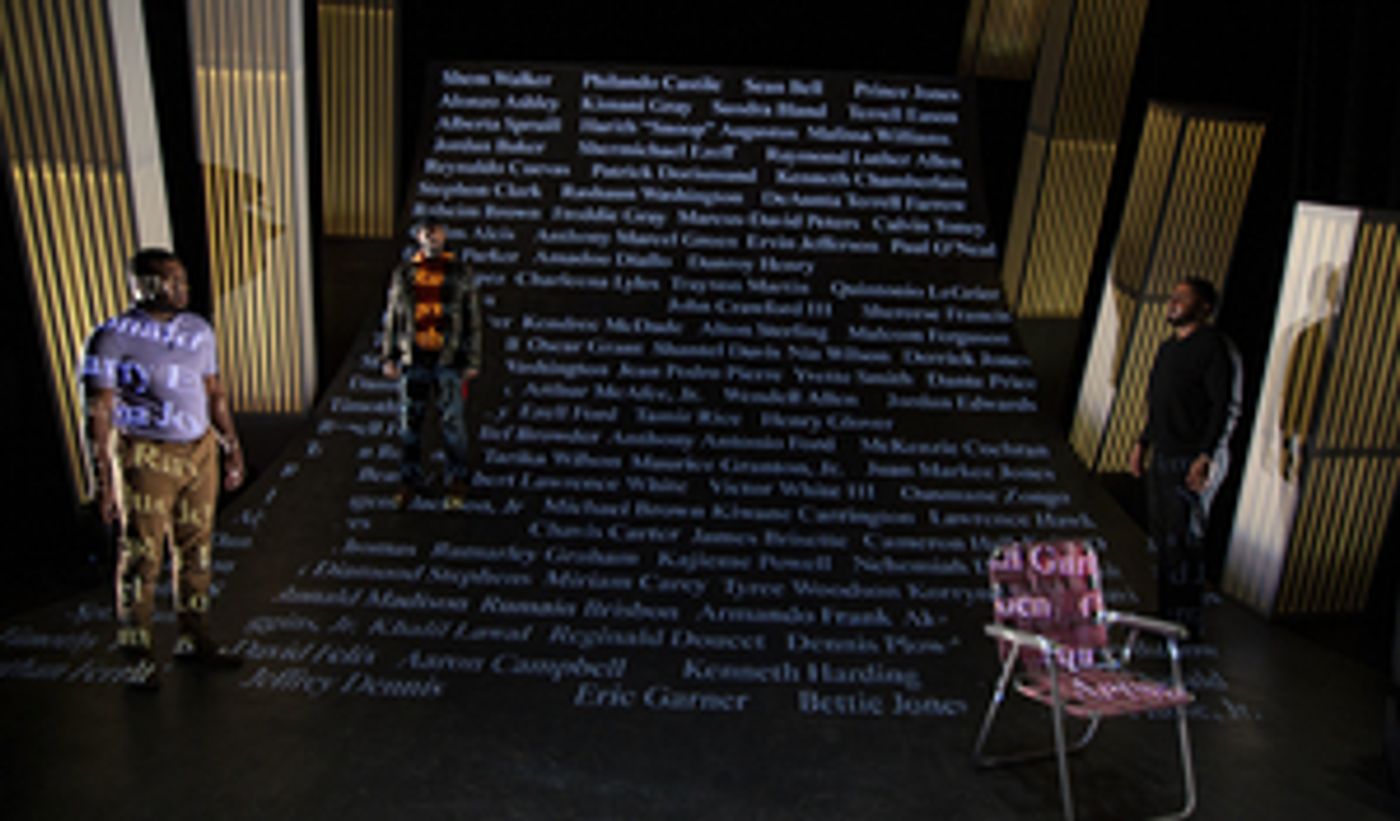Police Killings of Young Black Men Viewed Through The Lens of Eternity: KILL MOVE PARADISE at REP Stage

Kill Move Paradise is not so much a play as a choral poem. While there are four characters in James Ijames' theater piece, currently on view at Columbia's REP Stage, and they are endowed with names and hints at backstories, their individual identities don't matter much. They are unified more than distinguished, engaged as they are in a common enterprise, chorally addressing the same issues. Specifically, they are all young or youngish African American men, all (apparently) killed by police gunfire, who are still coming to terms with the ongoing trauma attendant upon having been born black and therefore vulnerable to what happened to them in today's America. And, having landed in an afterlife of some kind, they are required now to come to awareness of their present circumstances, and apparently to heal from the inner wounds their earthly lives have inflicted.
This begs the question: Why only black men in this space? Women and non-black people have also been admitted to the afterlife, according to the Christian mythos that seems to inform the world of the play. But references to that Christian mythos may supply answers. The closing poetry of the show is a recursive chanting of Matthew 6:33 ("Seek ye first the kingdom of God and his righteousness") in proximity with John 14:2 ("In my Father's house are many mansions"). Together the use of these verses suggests that the business of this post-mortal space the speakers occupy may be a re-orientation to the "kingdom," perhaps making a purgatory of this space, but also one in which the process of purgation must be done differently and separately for different groups.
Not that the space is just one mansion within the afterlife. Another thing it clearly is is a physical theater. The characters can see the audience watching them, and they comment on the audience, at times rather critically. (I am not the first reviewer to sense a hostile note in this commentary, perhaps baiting "an older, whiter audience" - the kind of audience the diverse young theater people at HowlRound so often find annoying.) To which it would be rational to respond that Ijames made the conscious choice to put this single-race colloquy in front of a diverse audience, and to profit financially from doing so.
The physicality of the space is also defined by a really impressive set, by Debra Kim Sivigny, a wall that morphs, via a grade reminiscent of a schoolground slide, into a floor, flanked with columns on either side that remind one of churches or courthouses or (and I think this was the primary intent here) heaven or Valhalla. Apart from its visually striking quality, it fulfills a thematically important role in the action. Some of the characters make their appearance by sliding down it, and most try to run back up, a Sisyphean and hence impossible task. What are the characters trying to escape from? Probably mortality; it is natural to want to go back to being alive, no matter the circumstances which led to one's having ceased to do that. But also blackness, a status which, as is stated at the show's beginning, confers the dubious power of instilling fear in many, and the fearful burden of being constantly targeted by blue-clad men with guns.
The weight of that burden is driven home with two striking illustrations: a dot-matrix printer downstage churning out a long tractor-paper list of victims of police shootings, and a projection onto the set at one point of the many names of some of the recent victims (pictured above). The realization fostered by these images, that the taking of black lives by the police is a phenomenon of scandalous dimensions, is powerfully driven home. At the same time, when we reach the individual testimonies regarding the deaths of the four characters onstage, there is so little information that we learn little. In many an argument, a Jesuit-trained friend of mine used to quote the principle that circumstances alter cases always. We lack circumstances here. Ijames, on his website, claims that his play constitutes "a portrait of the slain, not as degenerates who deserved death but as heroes who demand that we see them for the splendid beings they are." This is more than Ijames has proved in dramatic terms. Far too many killings? Yes; that he has proved. That the slain were all "splendid beings"? No; that he has not.
Whatever one may think of the piece, there can be no dispute that the acting and the production were splendid. The ensemble (Dylan J. Fleming, Jonathan Del Palmer, Christian R. Gibbs, and Tendo Nsubuga) ranged engagingly through an enormous gamut of emotions (some readable, some deliberately mysterious) and wide variety of performance styles. I hope to see them all again. Director Danielle A. Drakes, seen to advantage at The REP last season as the performer in Anna Deveare Smith's one-woman show Twilight: Los Angeles, 1992, helms this show with insight and care - although I could have done with a few fewer unsuccessful attempts to scale the slide.
Three Stars.
Kill Move Paradise, by James Ijames, directed by Danielle A. Drakes, presented through March 8 by REP Stage at the Studio Theatre, at the Horowitz Visual and Performing Arts Center of Howard Community College, 10901 Little Patuxent Parkway, Columbia, MD. Tickets $15 to $40. Adult language, adult themes, references to gun violence, brandishing of an orange-capped gun. A "healing space" is provided.
Photo credit: Katie Simmons-Barth.
Videos

